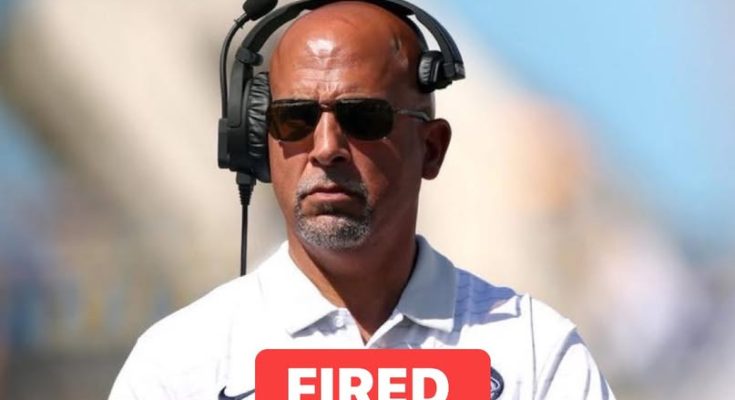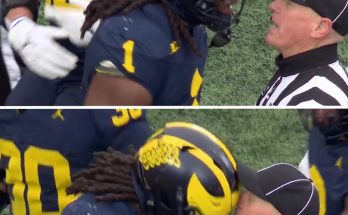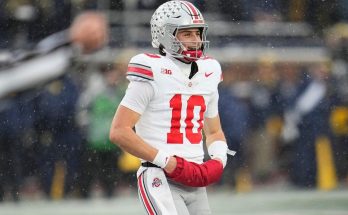In a shocking turn of events that has sent ripples through college football, Penn State University has officially dismissed head coach James Franklin, according to reports from ESPN’s Adam Schefter. The news, which broke early Monday morning, has left fans, alumni, and players stunned, ending one of the most polarizing coaching tenures in recent college football memory. Franklin, who has been at the helm of the Nittany Lions since 2014, departs a program he helped rebuild from the depths of post-sanction recovery to national prominence—yet never quite managed to push across the final championship threshold that so many expected.
Franklin’s dismissal marks the end of an era defined by both promise and frustration. Over 11 seasons, he led Penn State to multiple 10-win campaigns, a Big Ten title in 2016, and consistent top-25 finishes. But for many within the program and fanbase, the gap between “very good” and “elite” never seemed to close. The team’s inability to consistently beat conference heavyweights like Ohio State and Michigan became a recurring sore spot, and after several years of near misses and high expectations that fizzled into disappointment, the university’s leadership decided it was time for a change.
Sources close to the athletic department indicated that the decision wasn’t made lightly. Franklin’s impact on the university extended far beyond the football field. He restored Penn State’s national credibility in the wake of scandal, turned recruiting into a national operation, and brought energy and modernity to a once-stale program. Yet in recent seasons, frustration grew as the Nittany Lions’ offensive inconsistencies, lack of postseason success, and failure to capture another Big Ten title cast doubts on whether Franklin could truly elevate Penn State into the elite tier of college football powerhouses.
According to insiders, tensions had been mounting behind the scenes since last season’s back-to-back losses to Ohio State and Michigan, followed by another disappointing bowl game showing. Despite landing five-star recruits and maintaining one of the nation’s most stable programs, Penn State continued to come up short when it mattered most. The 2025 campaign, viewed by many as a “prove it” year for Franklin, began with high hopes but quickly unraveled after a string of uninspired performances and a devastating home loss that reportedly sealed his fate.
Athletic Director Pat Kraft is expected to address the media later this week, but early reports suggest the administration felt that a leadership change was necessary to “reignite competitive fire” within the program. A statement released by the university praised Franklin for his service and leadership but emphasized a desire to “move forward in pursuit of championship-level excellence.”
For Franklin, this dismissal brings an abrupt end to what was once one of the most promising coaching careers in college football. When he arrived at Penn State in 2014, the program was still reeling from NCAA sanctions and a fractured reputation. Franklin brought charisma, energy, and an unrelenting belief that Penn State could not only recover but thrive. His early success—culminating in the 2016 Big Ten Championship and a thrilling Rose Bowl appearance—seemed to validate that vision. But as the seasons went on, the expectations grew heavier, and the same story began to repeat itself: high preseason rankings, midseason promise, and late-year disappointment.
Despite those frustrations, Franklin leaves behind a legacy that cannot be ignored. He turned the Nittany Lions into a recruiting powerhouse, regularly landing top-10 classes. His “Dominate the State” mantra revitalized local recruiting pipelines and helped restore pride in Pennsylvania football. Off the field, Franklin’s commitment to academics, diversity, and player development earned him widespread respect. Under his guidance, Penn State players consistently graduated at high rates, and many went on to NFL careers.
Still, for a fanbase as passionate and tradition-rich as Penn State’s, good was never going to be good enough. The Nittany Lions’ inability to reach the College Football Playoff or defeat Ohio State more than once in 11 tries became the central narrative of Franklin’s tenure. While his teams were rarely bad, they often failed to be truly great—and in a conference as competitive as the Big Ten, that distinction proved fatal to his job security.
In recent months, speculation about Franklin’s future had intensified, especially as Penn State’s offense continued to struggle despite highly touted recruits and multiple coordinator changes. Critics accused him of mismanaging talent, lacking tactical flexibility, and over-relying on recruiting rankings instead of player development. Supporters, on the other hand, argued that Franklin had been a victim of unrealistic expectations in an era where Ohio State and Michigan wielded financial and institutional advantages that made sustained dominance difficult.
Regardless of which side one takes, the decision to part ways marks a major crossroads for Penn State football. The search for Franklin’s successor is already underway, and sources indicate that the university will target a proven winner—someone capable of taking an already strong foundation and turning it into championship reality. Early names being floated include high-profile coordinators from the SEC and NFL, as well as rising college head coaches who have demonstrated the ability to develop quarterbacks and modernize offenses.
For the players, the news hit hard. Many current Nittany Lions took to social media to express gratitude toward Franklin, with one calling him “a father figure” and another saying, “He believed in me when nobody else did.” Those emotional tributes underscore the human side of coaching transitions—how a leader’s influence extends far beyond wins and losses. Franklin was known for his player-first approach, often emphasizing mental health, family, and life beyond football. That focus made him a beloved figure in the locker room even when results on the field fell short.
As Penn State prepares for a new chapter, the timing of the dismissal raises questions about the program’s immediate future. With recruiting cycles year-round and transfer portal windows looming, the university will need to act swiftly to stabilize the situation. Continuity and communication will be critical to preventing an exodus of key players and recruits. Interim coaching duties are expected to fall to one of Franklin’s longtime assistants, though no official announcement has been made.
The college football landscape, meanwhile, is watching closely. Franklin has long been viewed as one of the sport’s most marketable and well-connected coaches, and it’s almost certain that he won’t be unemployed for long. His ability to build culture, recruit at an elite level, and manage large programs makes him an attractive candidate for both college and NFL opportunities. Some analysts have already speculated that a return to the SEC or a move to television commentary could be in his future.
For Penn State fans, the emotional aftermath of Franklin’s dismissal will be complex. Gratitude for what he achieved—reviving a program from near-collapse—will mix with disappointment over what could have been. In many ways, his era will be remembered as a story of almosts: almost breaking through, almost reaching the playoff, almost reclaiming national dominance. Yet even in parting, Franklin leaves the Nittany Lions in far better shape than he found them, with a deep roster, strong infrastructure, and a national profile that remains among the best in college football.
College football, at its core, is a business of results and expectations. Coaches are judged not only by wins and losses but by timing, narrative, and momentum. For James Franklin, the arc of his Penn State journey reflects both the volatility and the beauty of the sport: the highs of triumph, the lows of unmet potential, and the relentless pressure to evolve. As one chapter closes in Happy Valley, another begins—and both Franklin and Penn State will now seek to redefine their futures in a sport that never stops moving.
In the end, this dismissal may serve as both a cautionary tale and a testament to the unforgiving nature of modern college football. Franklin did nearly everything right—he rebuilt, he recruited, he reenergized—but in the end, “almost” wasn’t enough. Penn State wanted championships, and after 11 years, it decided it could no longer wait.



